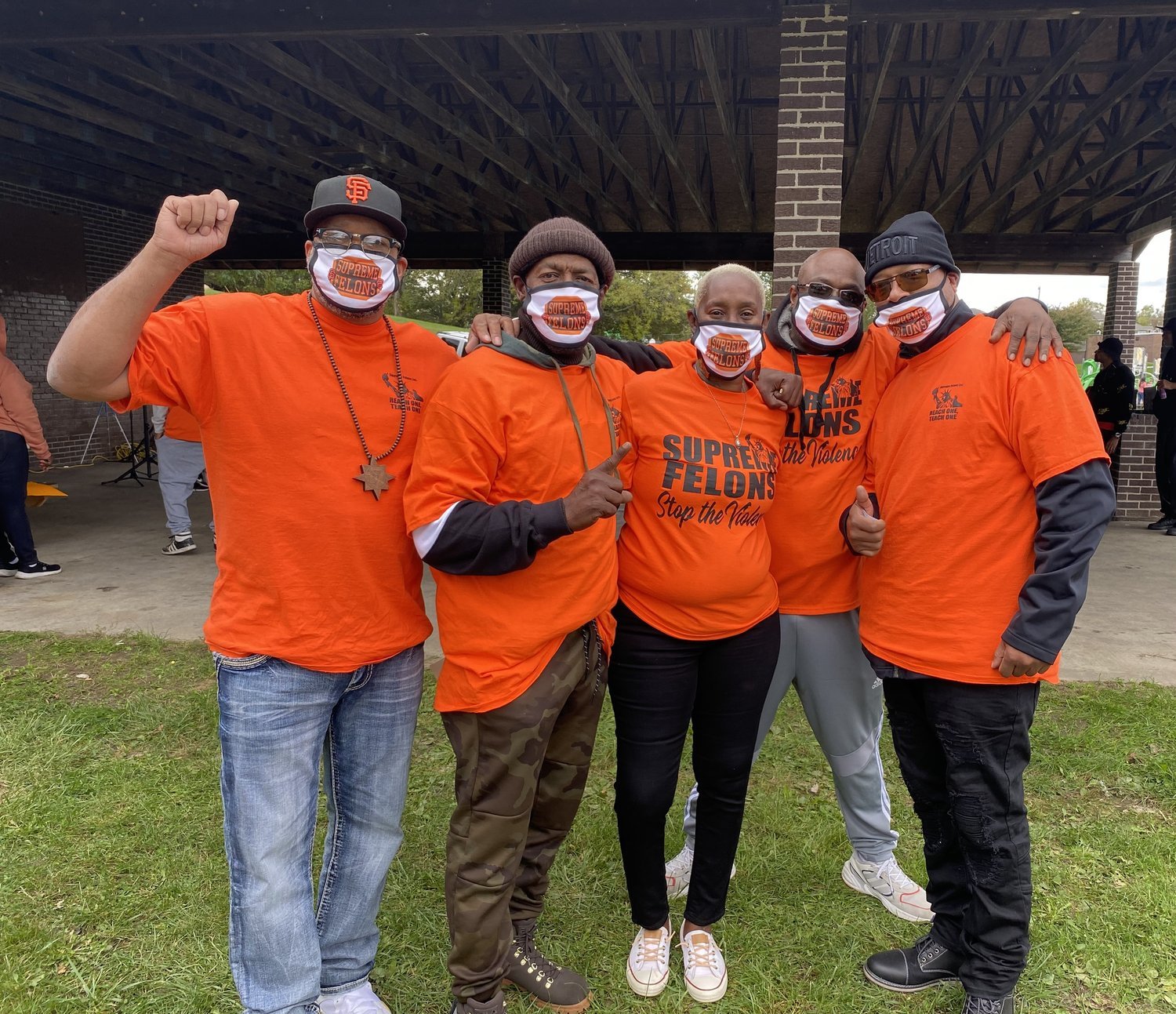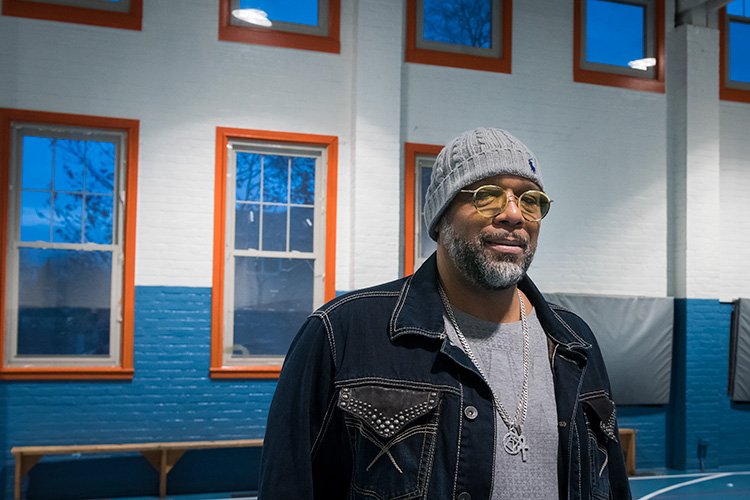By Ryan Makuch
Some men and women are simply called to serve their communities. A man with a “burning passion” to help certainly falls into that category, and that is who Bryan Foley is.
Foley is an instrumental player in the Supreme Felons, an organization that aims to protect young people from falling into the traps of drugs and crime that can be so prominent in areas of Ypsilanti like the South Side, where opportunities for economic advancement are slim-to-none, especially for young people.
The work being done by Supreme Felons is work that Foley has been doing for much of his own life, but one day he received a call from Billy Cole, Foley’s partner in work with Supreme Felons.
“I had always been engaged with community activism, trying to keep our youths out of harm’s way, and to stop them from creating harm,” said Foley. “One day Billy Cole contacted me and said, ‘Hey, man, you’re in the Supreme Felons’,” Foley said with a laugh.
From that moment, Foley has been an actively engaged, and official, member of the Supreme Felons, continuing his exceptional work while also serving as an effective conduit for the organization given his connections and continuous community engagement.
“I know no other way of life to live other than to give back to a community that I was kind of instrumental in creating, if you will, with my own hand by selling drugs to my own community.”
“My actual passion comes from empathy; from having once been a young man on the street,” says Foley, when discussing what his love for his work, and his passion, is rooted in. “I’ve been there. I know what it is to be a victim of your environment, a victim of systemic racism, not understanding why you were doing the things you were doing.”
Foley said that these kinds of thoughts and feelings were what took him down the darker part of his life’s path. Pursuit of “escapism” led to Foley’s introduction to drugs, which led to minor crimes, which led to violent and more frequent crimes, which ultimately would lead to Foley landing in a federal penitentiary on a bank robbery charge.
It’s a vicious cycle that Foley works to help lead young people away from. “We see our young people in pain,” Foley said. Foley and the Supreme Felons are unique in that, as Foley states, “We reach them through actually seeing them. We’re in the streets. We’re here 24/7.” Foley emphasizes the communal aspect of this sort of assistance and says that many of these experiences and interactions with young people come because of familial connections.
Family and community are the names of the game for Foley. “There’s a responsibility in that where we are ‘our brother’s keeper’,” Foley would say. “And when you hear us say in our community ‘uncle’, ‘nephew’, and stuff like that, that’s for real.”
Perhaps no project that Foley has had involvement in epitomizes that more than the renovations of The Magic Square. The Magic Square, or simply ‘The Square’, is a basketball court/park in the South Side of Ypsilanti, where Foley dedicates much of his time and energy to serving. Several collegiate and professional basketball players have passed through this park during their time growing up in Ypsilanti.
Unfortunately, it had fallen into disrepair. Foley, however, had a plan that started with one phone call. An artist friend of his had wanted to pant the court at The Square. Foley devised a plan and sent it along to Frances McMullen, City Manager of Ypsilanti, who liked the look of the plan. Another roadblock stood in the way when it was revealed upon a site visit that the court’s surface was unusable in its current state. What looked to be an obstacle ended up being a blessing in disguise, as the city of Ypsilanti would dedicate budgetary funds to fixing the court as well as putting into better condition the entire park.
Foley is also actively involved in the repairing of the communal softball diamond, used regularly, but specifically for a yearly softball game that serves as a coming-together for the community. Expecting $5-10,000, Foley requested funds from an equity fund the city of Ypsilanti set up to reappropriate funds to a Black community much more heavily affected by the then-marijuana laws of Michigan. Instead, State Senator Jeff Irwin issued $50,000 to the project to aid in the revamping of the park. The University of Michigan also chipped in another $3,000 to the project following an interview with Foley.
Foley was understandably elated with the news and ensured that the community worked quickly to take care of what was set to be their newest public meeting area. “We formed some community groups, people got together, and we cleaned up all the trash and cut down all the overgrowth [of the trees],” shared Foley, who also noted how important it is for communities to take pride in their own things.
“We have a tendency to be a little more responsible, a little more protective,” conceded Foley, who noted that he wanted this to be a motivating factor for continually communal upkeep of this park, and all others in the community.
“But,” said Foley, delving deeper into the basis of targeting parks to renovate, “the primary purpose of redoing the park is so that our citizens, our community, our children, our elders, our family members, can have a place in their own neighborhood that is theirs and that they can come and feel safe and be safe.” He would add, “It is a safe zone, it’s a viable zone, it’s a healthy environment with our community.”
This leads into the foundation of Foley’s work with AFCAA, centering heavily around the club’s community work in Ypsilanti. The introduction between Foley and the Club Chair, and direct point of contact with Foley, Bilal Saeed started around Thanksgiving 2021 ahead of the Giving Back 2 Give Thanks turkey drive with Blake Corum.
“It was suggested to Bilal that he reach out to stakeholders in the community, such persons as myself because they wanted to do it on the Southside at Parkridge Community Center.” Foley would add, “They reached out to me as a member of the Supreme Felons, and so that we would facilitate the turkey giveaway … because they don’t know the people here like we do. So that trust factor was there.”
After this moment, Foley says that he and Saeed “just kind of clicked” as a result of doing the same things, but in different realms.
Foley loves the idea of utilizing sport as a hook for young people, and this would help trigger his involvement with CLR Academy. Due in large part to Foley’s work, CLR Academy can also expand out further into the Southside of Ypsilanti, which the organization looks forward to doing more and more this summer.
“What we’re trying to do is use those sporting activities to draw [ youths], then we can assist our youths because now we have their attention to get them into educational activities–get them back in school, help them with school, and advance them further into the trade programs, college, whatever there is, but to get more education in them.”
Towards the end of AFCAA’s discussion with him, Foley told the club a secret. “Let me share this with you – I don’t like soccer.” He laughed, “Let me back this up: I didn’t like soccer. At all.”
“I sat down with Bilal one day. And he said, ‘why don’t you like soccer?’. And I said ‘well when I was in fifth grade, we had a teacher trying to introduce us the sport of soccer to us’ and she was running around with her high heels on and she kicked me in the shin.”
This childhood experience seemed to scar Foley for life, at least until Saeed came into the frame.
“Bilal sat me down, and he began to tell me the history of soccer, and that soccer is the number one sport on earth. Then he began to tell me the social ramifications of soccer and the relationships that [soccer] is founded upon. Not just community/state, but international rivalries and camaraderie, and he gave me a history lesson in soccer!”
Foley called himself “transformed” after that, with a better, more full, appreciation of soccer.
“It’s not just about kicking the ball and running up and down the field. It’s about human relationships and bettering them.”
With the Supreme Felons, and men like Foley, and Billy Cole, both of whom will be presenting Blake Corum with his community award at the AFC Ann Arbor home opener on May 8th, the model of using soccer to better human relationships is certainly well underway in the communities we love and serve.
We appreciate the dedication and service to his community of Mr. Bryan Foley, and we are thankful that he serves in the same community that we are privileged to support.
About AFC Ann Arbor
Association Football Club Ann Arbor (AFC Ann Arbor) was founded in 2014 and competes in USL2 (men’s) and USLW (women’s) national amateur leagues. We are a community-based club, focused on equity, justice, and anti-racism. We consider all of our stakeholders, including supporters, players, staff, and ownership to be part of the #AFCAAFamily. Come On You Mighty Oak!





